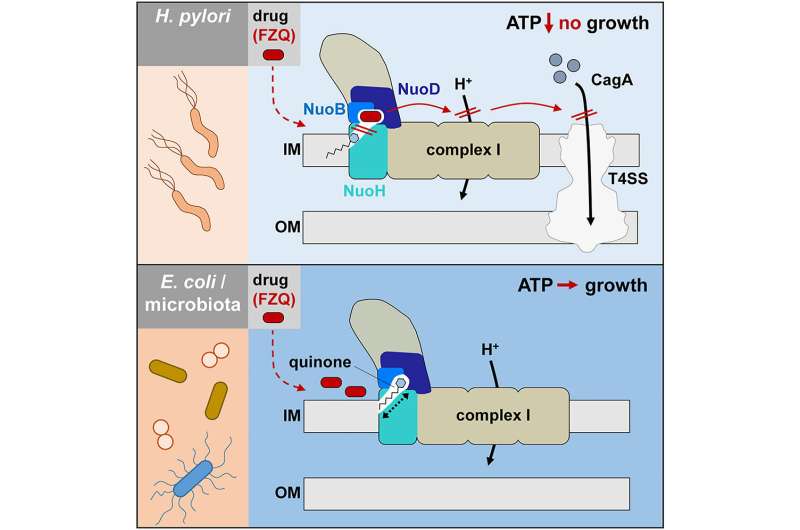This article has been reviewed according to Science X's editorial process and policies. Editors have highlighted the following attributes while ensuring the content's credibility:
fact-checked
peer-reviewed publication
trusted source
proofread
Researchers make progress in battle against Helicobacter pylori and stomach cancer

LMU researchers have discovered a weakness in the bacterium Helicobacter pylori, which could be exploited to develop new drugs.
The pathogen Helicobacter pylori, which is responsible for widespread illnesses such as gastric ulcers and stomach cancer, has a weak point, which could be exploited to create new drugs. This was discovered by a research group led by LMU biologists Professor Rainer Haas and Dr. Wolfgang Fischer from the Max von Pettenkofer Institute of Hygiene and Medical Microbiology. Their results have now been published in the journal Cell Chemical Biology.
More than four billion people worldwide are infected with the stomach bacterium, leading to more than 800,000 cases of stomach cancer every year. Because the bacterium is becoming increasingly resistant to current drugs, the World Health Organization (WHO) has classified it as a pathogen with high priority for the research and development of new antibiotics. New approaches and therapeutics are urgently required to replace or complement established treatment methods.
The new study has taken an important step in this direction. "We were able to demonstrate that the bacteria are very sensitive to certain substances that inhibit cellular respiration," says Haas.
Fighting helicobacter and protecting the gut microbiome
The researchers were able to identify several compounds from various substance groups that incapacitate the respiratory chain of H. pylori even in small concentrations. For other useful bacteria, including representatives of the normal gut microbiome, these substances are unproblematic. These bacteria tolerate larger amounts of the substances.
The authors of the study used a broad spectrum of biochemical and microbiological methods as well as molecular modeling techniques to discover why H. pylori reacts so sensitively to these substance groups. They identified the cause in a slightly modified structure of the so-called quinone binding pocket in respiratory complex I.
This Achilles heel offers great potential for the development of specifically tailored new active agents that could be used as pathogen blockers against H. pylori. "Our results reveal a surprising weakness in the metabolism of these bacteria, which are well adapted otherwise to their unusual environment," says Fischer.
The research team at LMU was also able to identify possible mutations that would make the bacteria less sensitive to the inhibitors. However, these mutations also weaken the metabolism of the pathogens. This means that less resistance is formed to the complex I inhibitors.
"Overall, our results are very promising," adds Haas. "We managed to identify a whole group of inhibitors that do not exhibit any cross-resistance with current therapeutics. They are less susceptible to the development of resistance and have a small impact on the gut microbiome."
More information: Clara Lettl et al, Selective killing of the human gastric pathogen Helicobacter pylori by mitochondrial respiratory complex I inhibitors, Cell Chemical Biology (2023). DOI: 10.1016/j.chembiol.2023.04.003
Journal information: Cell Chemical Biology
Provided by Ludwig Maximilian University of Munich





















